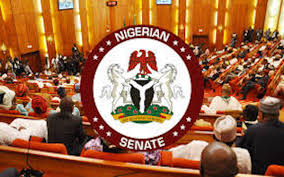The request by President Muhammadu Buhari for revision of the 2022 fiscal framework was approved by the senate after consideration of the report of the Finance Committee on Thursday.
This was just as the senate President Ahmad Lawan, asked the Federal Government to do all within it’s power to stop the theft of crude oil by economic saboteurs.
He also threw another challenge on the need to stop the importation of refined petroleum products into the country, to cut down on expenditures.
The approval for the revised fiscal framework came after the consideration of a report by the Senate Committee on Finance.
The report was laid by the Chairman of the Committee, Senator Olamilekan Adeola.
The Senate approved US$73 per barrel as proposed by President Buhari.
It also approved Oil Production Volume of 1.600 million per day; Petroleum Motor Spirit (PMS) subsidy of N4.00 trillion (NGN); and a cut in the provision for Federally funded upstream projects being implemented by N200 billion from N352.80.
While approving an increase in the Federal Government Independent Revenue of N400 billion, the chamber also approved an additional provision of N182.4 billion to cater for the needs of the Nigeria Police Force.
It approved debt service provision of N76.13 billion, and net reductions in Statutory Transfers by N66.07 billion.
A breakdown of the net reductions are as follows: NDDC, by N13.46 billion from N102.78 billion to N89.32 billion; NEDC, by N6.30 billion from N48.08 billion to N41.78 billion; and UBEC, by N23.16 billion from N112.29 billion to N89.13 billion.
Others are Basic Health Care Fund, by N11.58 billion from N56.14 billion to N44.56 billion; and NASENI, by N11.58 billion from N56.14 billion to N44.56 billion.
The chamber also approved the fiscal deficit of N7.35 trillion.
Adeola, in his presentation, said that the total budget deficit is projected to increase by N965.42 billion to N7.35 trillion, representing 3.99% of Gross Domestic Product (GDP).
He disclosed that, “the incremental deficit will be financed by new borrowings from the domestic market.’
Lawmakers, who took turns to make contributions during consideration of the report on the review of the 2022 fiscal framework, blamed the country’s economic downturn on crude oil theft.
Senator Olubunmi Adetunmbi (Ekiti North), said the federal government and security agencies owe it as a duty to stop the stealing of our common wealth.
He lamented that at a time when most countries of the world are reaping bountiful harvest due to the increase in crude oil prices occasioned by the Russia-Ukrainian crisis, Nigeria is left out owing to its inability to meet its OPEC quota.
The Senate Leader, Yahaya Abdullahi, who spoke along the same lines as Adetunmbi, said the country should be in a state of mourning over what is currently happening to it.
He attributed the failure of security agencies to protect oil assets as a major reason for the decline of the economy.
He expressed worry over the increasing cases of oil theft inspite of huge resources allocated to the military, police and other security agencies.
Other such as Senators Gabriel Suswam (Benue North East), Betty Apiafi (Rivers West), called on the chamber not to hastily approve the President’s request to adjust the 2022 fiscal framework until certain questions are answered.
While Suswam raised concerns on the widening gap in budget deficit and the federal government’s decision to resort to funding from the Capital Market, Apiafi, on the other hand, demanded answers from the NNPC and relevant agencies on solutions in place to curb crude oil theft.
The Senate President, Ahmad Lawan, in his concluding remarks, called on the Federal Government to take “radical” steps towards stopping the theft of crude oil by economic saboteurs.
He also called for a stop to the importation of refined petroleum products into the country, so as to cut down on expenditures incurred in the process, as well as to maximize profits from crude oil sales.
“This (crude theft) is not something to play politics with, and I don’t think the answers are going to be easy to come by.
“Radical decisions would have be taken, but before we find answers we have to live with this, but we have to be fast as possible in looking for answers.
“I had a session with the Chief of Defence Staff about a month ago, and my discussion with him was on the oil theft and the efforts of our security agencies to combat this menace.
“And like we know, our security agencies are doing their best but we have people – our people – who are sabotaging the oil industry, because the oil theft is not perpetrated by somebody else but by people who are citizens.
“So, we need to continue to support the security agencies in whatever way possible so that they are able to deal with this.
“I also believe that, whether there is oil theft or not, until we stop the importation of refined products to Nigeria, we will never get the best out of the oil and gas industry.
“So, we should work to ensure that we produce our refined products locally, because that is one way of cutting out our expenditure on importation.
“I also think that diversification of the economy is key, because we depend so much on this oil and gas industry, the slightest issues that affects it internationally affects us seriously in our country”, the Senate President said.


